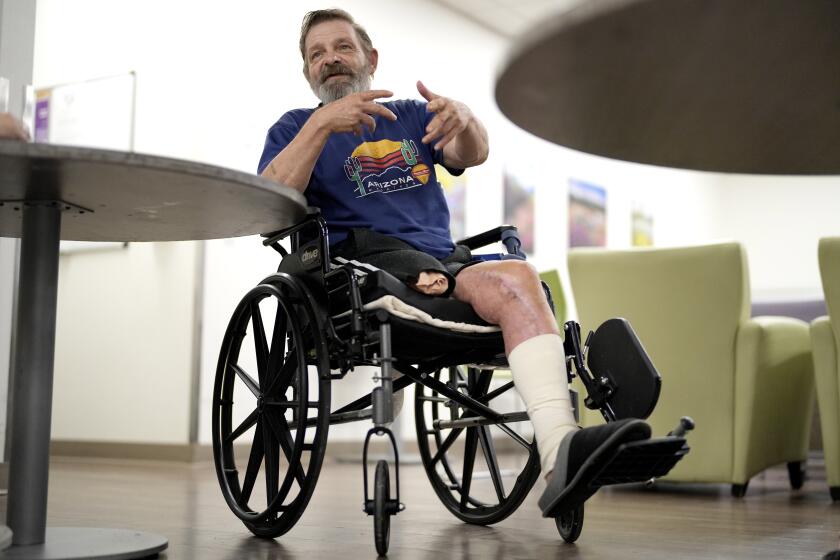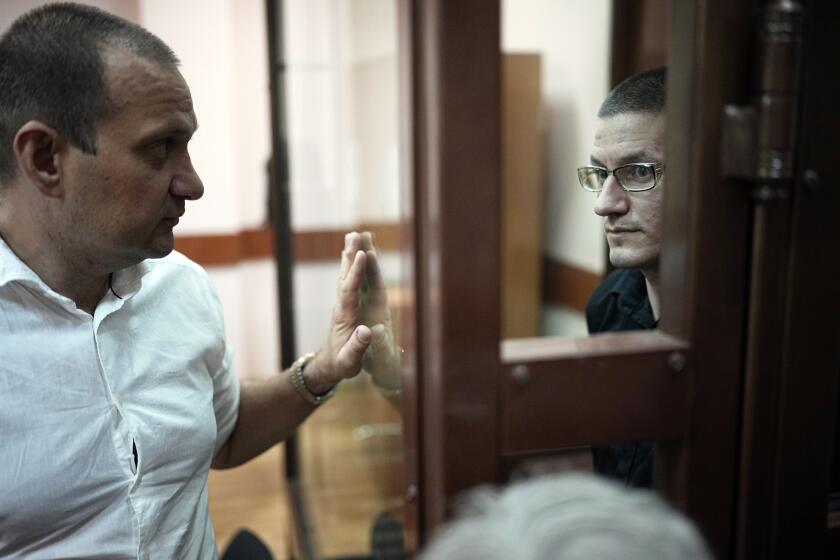Sri Lankan President Wounded in Suicide Bomber Attack
This island nation’s president narrowly escaped a suicide bomb attack here Saturday that wounded her and killed at least 14 people three days before a presidential election.
President Chandrika Kumaratunga, who had been speaking at her final campaign rally in the run-up to Tuesday’s vote, was rushed to a hospital after suffering shrapnel wounds. Officials reported that she was out of danger, although one piece of shrapnel lodged behind her right eye.
“Her condition is stable,” said Lakshman Jayakody, Sri Lanka’s minister for cultural affairs. “But doctors are worried about the eye.”
The attack occurred when a woman trying to leap over a barricade detonated a bomb she had strapped to her body. Several of the president’s security guards, who had restrained the woman as she tried to jump the barrier, were killed. The bomber also was killed, and a total of 14 bodies were scattered in front of Colombo’s Town Hall. More than 105 people were injured.
Shortly afterward, a second bomb blast killed at least seven people and injured 40 at a rally for the main opposition, United National Party, north of Colombo, but it appeared to be unrelated to the assassination attempt.
It was unclear what effect the assassination attempt would have on Tuesday’s election. Kumaratunga, leader of the People’s Alliance, is running in a close race against former Prime Minister Ranil Wickremesinghe, the leader of the United National Party.
Maya Mirchandani, a Star TV reporter who was at Kumaratunga’s rally, said the president had paused for a minute to answer a question when the bomb exploded about 15 feet away.
“She fell on the ground. I don’t know how many security men fell on her,” Mirchandani said.
Finance Minister Gamini L. Peiris and Provincial Councils Minister Alavi Moulana were among those injured. The government imposed an immediate curfew in Colombo.
The attack had all the markings of the Liberation Tigers of Tamil Eelam, a guerrilla group that has been waging a bloody fight for independence against the government for 16 years. Suspected LTTE suicide bombers, known as Black Tigers, have killed scores of civilians and politicians in recent years, including Sri Lankan President Ranasinghe Premadasa in 1993. LTTE members were convicted of the 1991 assassination of former Indian Prime Minister Rajiv Gandhi. Sri Lanka, formerly known as Ceylon, lies southeast of India’s southern tip.
In 1996, a suspected LTTE truck bomber killed about 100 people and injured about 1,400 in an attack on Sri Lanka’s Central Bank.
The LTTE, better known as the Tigers, did not claim responsibility for Saturday’s attack and has not ordinarily done so after other attacks. The group, one of the most well-funded and best-organized of its kind, has been designated a terrorist organization by the United States. Tiger cadres, who include women and children, often swallow cyanide pills if they are in danger of being captured.
Police arrested 15 suspects in an overnight sweep, said a senior police official, speaking on condition of anonymity.
Saturday’s assassination attempt was the latest drama in Sri Lanka’s civil war, one of the bloodiest and longest-running conflicts in the world. The country’s minority Tamil population--predominantly Hindu and spread across the island’s north and east--is pitted against the majority Sinhalese, mostly Buddhist and located in the south.
The LTTE wants independence for the Tamils and controls large swaths of territory in the north and east. The Sinhalese-dominated government in Colombo refuses to grant a separate state. About 61,000 people have died in the fighting, which most analysts believe neither side can win.
The attack on Kumaratunga, whose father and husband both fell victim to political violence, came on the heels of a series of bold strokes by the Tigers. Last month, an LTTE counteroffensive routed government positions in the north and led to the capture of about 100 square miles of territory.
As Saturday’s events in the capital unfolded, the Tigers were mounting an assault on government positions at Elephant Pass, on the outskirts of Jaffna, the country’s second-largest city.
More than 650 guerrillas and soldiers have been killed since the fighting started there last weekend, according to government figures.
The attack occurred about 9:15 on a drizzly night on the last day of campaigning. The president had just completed a speech in front of the Colombo Town Hall inside a compound filled with several thousand supporters, each of whom was supposed to have been searched before entering.
It was unclear how the bomber was able to get inside the area--or how she got so close to Kumaratunga. Witnesses said that, for much of the rally, she was seated in a section usually reserved for the president’s closest supporters.
Panduka Samarasekara, who witnessed the explosion, said he saw about 15 people on the ground after the blast.
“There was a lot of blood, but I saw the president being driven away,” he said.
A large majority of voters elected Kumaratunga in 1994 on her promise to bring peace to Sri Lanka. She began talks with the Tigers and entered into a cease-fire, but in 1995 the Tigers broke off the talks and called off the cease-fire. Shortly after, the Sri Lankan army captured Jaffna, the Tamil cultural capital. Since then, Kumaratunga has been unable to push through the National Assembly a package of constitutional reforms designed to give the minority Tamils more rights. And the war has become a stalemate.
In recent weeks, the LTTE has appeared to tilt in favor of Wickremesinghe, who has promised to negotiate with the Tigers. The Tigers have urged Tamils not to vote for Kumaratunga and have even allowed United National Party politicians to campaign for Wickremesinghe inside LTTE territory.
After so many years of war, many Sri Lankans have grown accustomed to death and violence. But Saturday night, as word of the assassination attempt spread through the capital, many reacted with revulsion.
“My God, what is wrong with the country?” asked Lasantha Wickrematunge, editor of the Sunday Leader, an English-language newspaper in Colombo.
*
Times staff writer Filkins reported from Koh Samui, Thailand, and special correspondent Karunatilake from Colombo.
More to Read
Start your day right
Sign up for Essential California for news, features and recommendations from the L.A. Times and beyond in your inbox six days a week.
You may occasionally receive promotional content from the Los Angeles Times.






